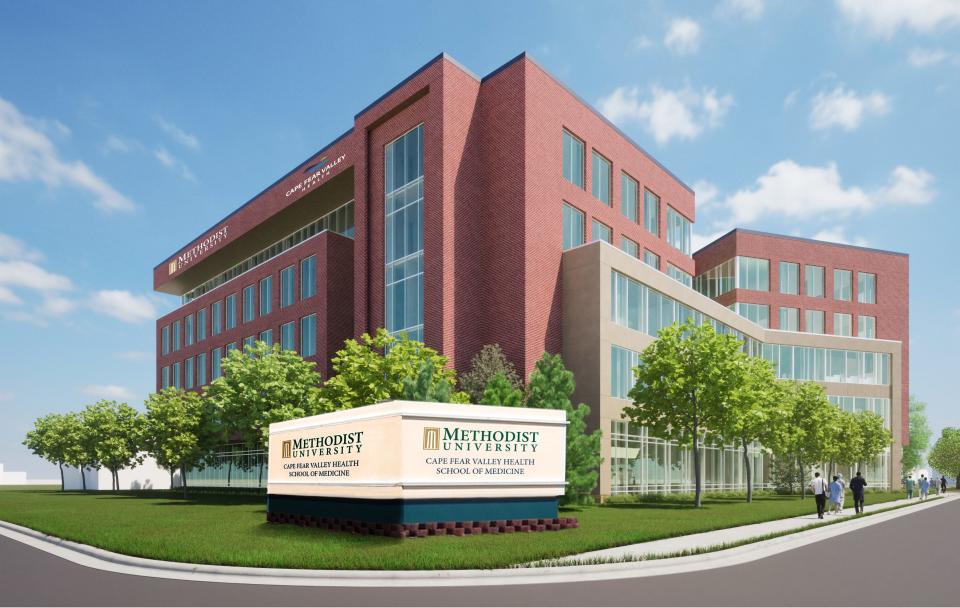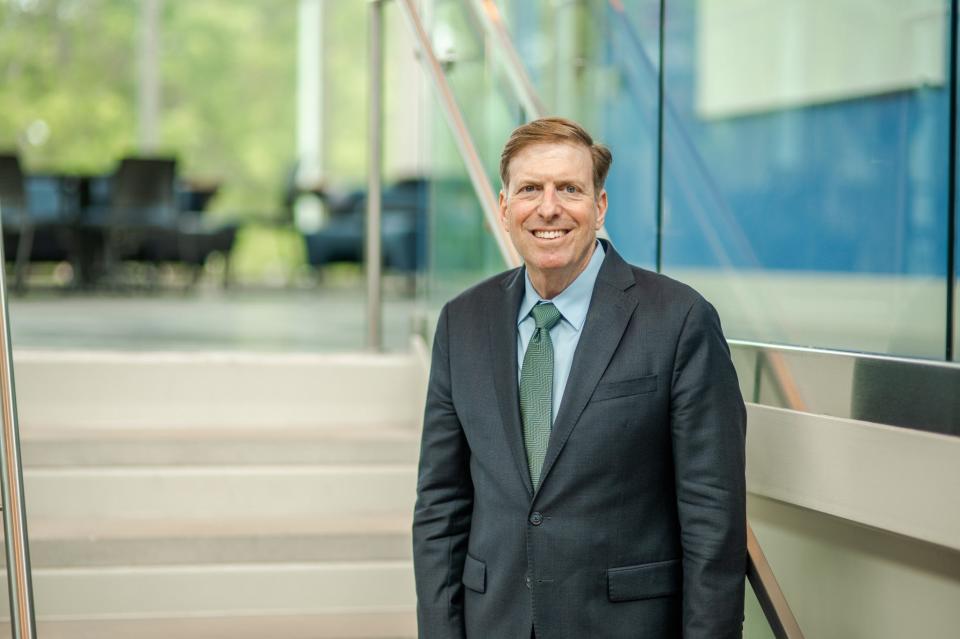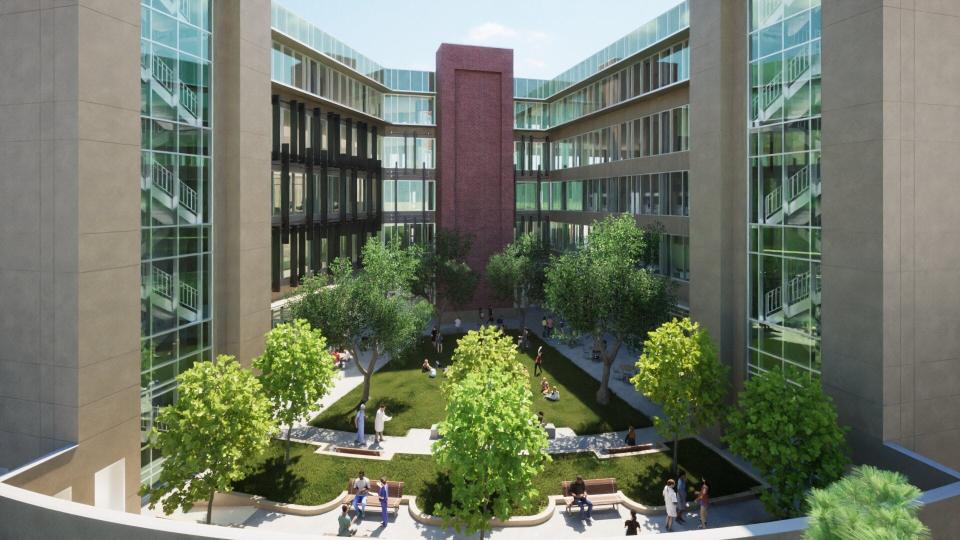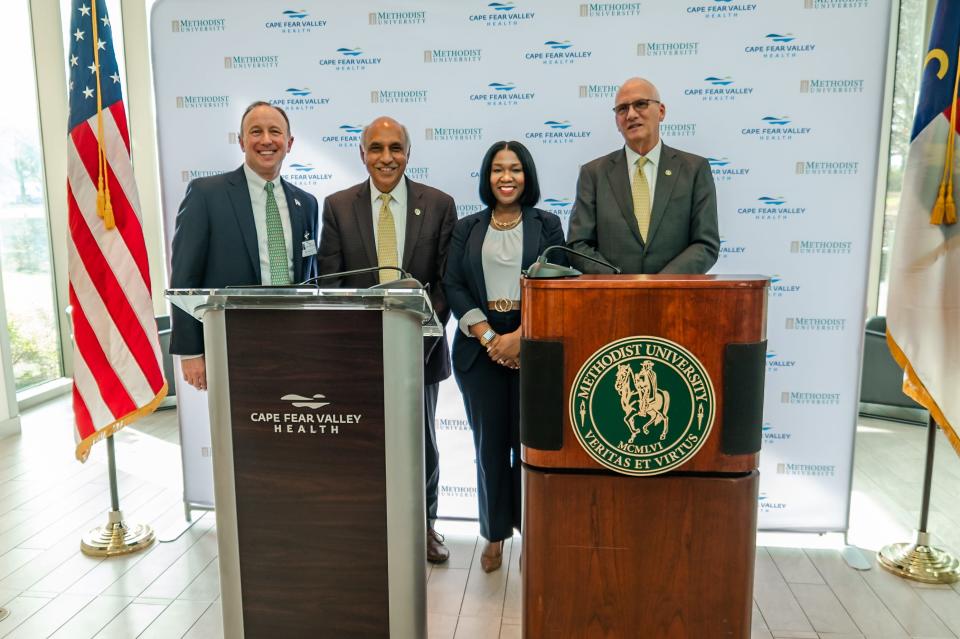Plans for Fayetteville's medical school are well under way. Here's what's new.
A preliminary site plan submitted to the Fayetteville Technical Review Committee late last month shows movement for a planned medical school between Methodist University and Cape Fear Valley Health.
The school’s founding dean, Dr. Hershey Bell, sat down with The Fayetteville Observer earlier this month to discuss the need for the school and timelines for where it stands.
“We’re really building on top of a foundation of excellence in health care education … A medical school at Methodist University is just a logical next step,” Bell said during the April 5 interview.

The need
Bell said conversations about starting a medical school in Fayetteville began in 2019, and Cape Fear Valley Health and Methodist University publicly announced a partnership in February 2023 to bring the medical school here.
Bell said that Mike Nagowski, Cape Fear Valley Health’s CEO, often refers to Cumberland County and the surrounding southeastern county region as a “doctor desert,” where patients may have long wait times and travel distances to see a doctor.
“And he’s not wrong in saying that,” Bell said.
Data from the Sheps Center for Health Services Research at the University of North Carolina shows that there are fewer physicians per capita locally, while the Association of American Medical Colleges projects a shortage of up to 48,000 primary care doctors nationally by 2034.
Despite medical schools to the north in Durham and Raleigh, Bell said, officials aren’t seeing those medical students go on to practice in southeastern North Carolina.
Data from the Association of American Medical Colleges shows that students are more likely to practice where they received their medical education or residency training, with 38% of doctors practicing in areas where they went to medical school, 46% practicing where they finished residency and 67% staying in areas where they completed both medical school and a residency.
Bell said the doctor shortage isn’t the only reason why a medical school is needed in the region.
Data shows that Cumberland County is ranked No. 72 out of 100 North Carolina counties for having the lowest health outcomes in the state.
Robeson is No. 98, he said.
“The No. 1 predictor of health outcomes is access to health care,” he said.
The state's top counties for positive health outcomes are Orange and Durham counties, where there are existing medical schools, Bell said.

Construction timeline
Bell said there are about four to five active timelines for bringing the medical school to Fayetteville.
The site, he said, is being prepared at 3518 Village Drive in Fayetteville; a contractor has been named; and the architect is finalizing work.
Within the next couple of months, Bell said, a Cape Fear Valley Health education building at that address will be torn down, and construction is expected to start at the end of this year.
The five-story, 125,00 square-foot building will feature two towers, one parallel to Village Drive, and another facing the medical school, with a middle connector and outdoor courtyard in between them.
If all timelines go well, Bell said, construction will be complete by spring 2026, and the first class could start in summer 2026.

Accreditation
Another timeline for the medical school, Bell said, is accreditation.
Bell said officials are working toward preliminary accreditation of the school from the Liaison Committee on Medical Evaluation.
“We’re prohibited from doing any recruitment until we receive preliminary accreditation,” he said.
If the preliminary accreditation is approved, the first class of students could be recruited by early fall 2025.
After the first class of medical students takes exams in their second year in 2028, the school could be eligible for provisional accreditation, and eligibility for full accreditation would be determined by spring 2030 when the first class of medical school students graduates.
“Whether it’s preliminary, provisional or full, the key is to be an accredited U.S. medical school,” Bell said.
During the accreditation process, officials will assess outcomes such as determining whether students are able to pass exams or how many students are placed in medical residency jobs.
Bell said an asset for Methodist University’s partnership with Cape Fear Valley Health is that Cape Fear Valley Health has 300 current residency positions annually.
Methodist University, he said, is already accredited by the Southern Association of Colleges and Schools Commission on Colleges.
Staffing and curriculum
Bell said the plan for the medical school is to hire 100 new instructors and faculty during the next couple of years.
The majority of the faculty will come from Cape Fear Valley Health’s eight hospitals and 90 outpatient clinics, meaning the school will have about 800 physicians appointed to the medical school, he said.
Methodist University already has health science degree programs for health care administration, nursing, occupational therapy assistants, physician assistants and doctorates of physical therapy and occupational therapy.
The medical school will allow students to start working toward medical education while completing their bachelor’s or earn a master’s degree while completing clinical training with local health care providers.

Fundraising and economic impact
Bell said that while university and medical system officials are working to develop a curriculum and finalize construction details, local residents and philanthropists are in the midst of a $12 million capital fundraising campaign for the school.
Bell said he thinks that health care improvements and the economic impacts the medical school will have on the local area help drive donors.
According to data from Dr. Michael Walden, a professor and state economist at North Carolina State University, the school is expected to bring $72 million to the area in annual spending; $9.6 million in tax revenue; 837 jobs; and 120 students per class.
“(It) creates new jobs, housing and support industries,” Bell said.
Methodist and Cape Fear Valley Health partner to create Fayetteville's first medical school
Dean named for new medical school at Methodist University
Research
Bell said research to focus on health outcomes in the region will also be part of the school. Researchers will be looking at social determinants like food and housing insecurities, finances, access to health care and how a patient’s environment factors into their health outcomes.
The school’s mission statement states that it will prepare graduates “to be socially accountable, community-engaged, evidence-based, compassionate, equity-focused physician leaders who will contribute to mitigating health disparities and improving health outcomes in southeastern North Carolina or wherever they may practice.”
“You can’t stop that train when a medical school comes to town …," Bell said. "You grow the number of doctors who improve health outcomes, and that’s the real win-win."
Staff writer Rachael Riley can be reached at rriley@fayobserver.com or 910-486-3528.
This article originally appeared on The Fayetteville Observer: Latest on Fayetteville, NC medical school

